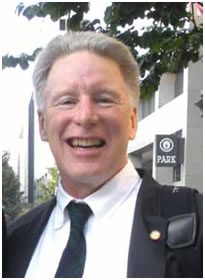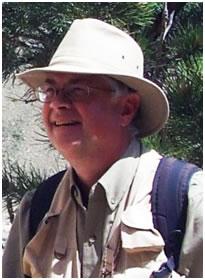| Week 32 |
| Tuesday. 07 August, 2018 | |
| 8:00 am |
Distinguished Workshop Series: Applied Concepts in Naturally Fractured ReservoirsTopic: Applied Concepts in Naturally Fractured Reservoirs2 day workshop and 1 day field tripEORI's Distinguished Workshop Series on August 7-9, 2018 will feature John Lorenz and Scott Cooper. The first 2 days of this workshop will be from 8am-5pm at the True River Cross Commons – 465 N Poplar, Casper, WY. All meals will be provided by EORI. Transportation to and details of the Outcrop fieldtrip will be discussed and arranged during the 2 day workshop. EORI is very pleased to offer this Core/Fracture Workshop and Field Trip with industry leaders John Lorenz and Scott Cooper. Pre-registration is required. And, because of the nature of this workshop/fieldtrip, attendance is limited to 20 participants. With that said, EORI is asking that those who register are committed to attending all 3 days. We will not be accepting walk-ins for this workshop/fieldtrip. We fully recognize that things come up, stuff happens, emergencies occur, etc. but we are asking that before registering, you organize your agenda, to the best you can, to fully commit to the full three days. The event is free to attend, but pre-registration is required as space is limited. After pre-registration, a confirmation email will be sent. This is not an official confirmation of your participation in the workshop and fieldtrip. You will receive a separate email once pre-registration is complete with final confirmation for this event. • Sponsored by the Enhanced Oil Recovery Institute. Contact Lon Whitman at 307-315-6450 with any questions. • Hosted by True Oil Who should attend?
Learning Outcomes:
Course Description:ClassroomThis is a hands-on class anchored with a 65-piece plus teaching collection of natural and induced fractures in core that students will work with during class exercises. The class provides insights into fracture mechanics and the origins of fractures, and uses those concepts in a very applied sense to instill an understanding of natural fractures and their potential effects on reservoirs. Discussions and lectures include differentiating fractures by type and the effects of different fracture types on reservoir permeability, and the fracture types expected in different structural domains and reservoirs. Course modules also include how to differentiate natural from induced fractures in cores and the use of image logs and their calibration with core. We will also discuss the interactions between natural fractures, in situ stresses, and stimulation fractures. Students will come away from the class with an appreciation of the wide range of structures that fall under the basket term “fracture”, and an understanding that different fracture types do not have the same effect on hydrocarbon reservoirs. Field TripDuring the field trip, we will examine shear and extension fractures in Tensleep carbonates and eolian sandstones, fractures that are related to folding on a basement-cored, Laramide anticline. The trip includes access to the heart of the Alcova Anticline and Freemont Canyon via a pontoon-boat excursion, for a comparison of equivalent Tensleep sandstones found on and off structure. Outcrops around Alcova include examples of fractures in granites, carbonates, sandstones and shales, fractures related to faulting, and the relationship between basement fractures and fractures in the overlying strata. Excellent outcrops exist of the Mancos, Frontier and Mowry shales and allow for hands-on characterizations and comparisons of the different fracture types in these lithologically and mechanically dissimilar shales. Discussions on the outcrop will include the effects of the observed fractures and their distribution on reservoir permeability, effective vs non-effective fracture systems, and the effect of lithology on determining both fracture type and intensity. Both the course and field trip serve as the background for discussions on mechanical stratigraphic controls of fracturing and production in conventional and unconventional reservoirs. About the Presenters:John C. Lorenz
John served as the Elected Editor (2001-2004) and President (2009-2010) of the American Association of Petroleum Geologists. As president he supported the advancement of the geosciences and their applications to hydrocarbon-related problems. His published papers and presentations on natural and induced fractures in reservoirs range geographically from the Lisburne Limestone in Alaska to the Spraberry Formation in Texas to the carbonates of northern Iraq. These papers and presentations have been awarded the AAPG Levorsen (twice) and Jules Braunstein awards. In 2018 he and Scott Cooper authored the “Atlas of Natural and Induced Fractures in Core.” He has worked closely with the oil and gas industry on problems involving reservoir dimensions and in situ permeability, gaining extensive hands-on experience with core analysis and fieldwork. He has led field trips, presented core workshops, and taught short courses for the industry-oriented geological community in numerous places around the world. Scott P. Cooper
|

 John earned an undergraduate B.A., with a double major in geology and in anthropology from Oberlin College in 1972. After serving in the Peace Corps, Morocco, he earned on his M.S., with a thesis on a Moroccan Triassic rift basin, at the University of South Carolina (1975), and Ph.D., studying the Nubian Sandstone in Libya and Cretaceous strata in Montana, at Princeton University (1981). John has worked for the U.S. Geological Survey in Louisiana and New Mexico, and for Sandia National Laboratories where he was the geologist for the tight-gas Multiwell Experiment in the Piceance basin. John has been a consultant since 2007, partnering with Scott Cooper in 2008 to form FractureStudies LLC which specializes in fractured reservoir characterization and effects. FractureStudies has counted over 50 companies as clients, working on fractured reservoir projects around the world.
John earned an undergraduate B.A., with a double major in geology and in anthropology from Oberlin College in 1972. After serving in the Peace Corps, Morocco, he earned on his M.S., with a thesis on a Moroccan Triassic rift basin, at the University of South Carolina (1975), and Ph.D., studying the Nubian Sandstone in Libya and Cretaceous strata in Montana, at Princeton University (1981). John has worked for the U.S. Geological Survey in Louisiana and New Mexico, and for Sandia National Laboratories where he was the geologist for the tight-gas Multiwell Experiment in the Piceance basin. John has been a consultant since 2007, partnering with Scott Cooper in 2008 to form FractureStudies LLC which specializes in fractured reservoir characterization and effects. FractureStudies has counted over 50 companies as clients, working on fractured reservoir projects around the world. Scott Cooper is a partner with Dr. John Lorenz at FractureStudies LLC, working on naturally fractured reservoir characterization issues in sandstones, carbonates and shales around the world from Alaska throughout the continental USA to Brazil, North Africa and Iraq. In 2018 Scott and John co-authored the “Atlas of Natural and Induced Fractures in Core”. Earlier in his career as a Senior Member of the Technical Staff at Sandia National Laboratories (a U.S. Department of Energy facility) Scott worked on numerous government and industry-supported energy-related research projects. Scott received a B.S. in geology from the South Dakota School of Mines and a M.S. in geology from the New Mexico Institute of Mining and Technology. His thesis work involved characterization and modeling of natural fractures in strata at Teapot Dome, a basement-cored anticline in central Wyoming, the database developed from that work continues to be used as a teaching tool in various industry fracture-modeling programs. Detailed descriptions and links to projects, published papers, open-file reports, short courses, core workshops, fieldtrips, webinars and the new Atlas are available at www.fracturestudies.com.
Scott Cooper is a partner with Dr. John Lorenz at FractureStudies LLC, working on naturally fractured reservoir characterization issues in sandstones, carbonates and shales around the world from Alaska throughout the continental USA to Brazil, North Africa and Iraq. In 2018 Scott and John co-authored the “Atlas of Natural and Induced Fractures in Core”. Earlier in his career as a Senior Member of the Technical Staff at Sandia National Laboratories (a U.S. Department of Energy facility) Scott worked on numerous government and industry-supported energy-related research projects. Scott received a B.S. in geology from the South Dakota School of Mines and a M.S. in geology from the New Mexico Institute of Mining and Technology. His thesis work involved characterization and modeling of natural fractures in strata at Teapot Dome, a basement-cored anticline in central Wyoming, the database developed from that work continues to be used as a teaching tool in various industry fracture-modeling programs. Detailed descriptions and links to projects, published papers, open-file reports, short courses, core workshops, fieldtrips, webinars and the new Atlas are available at www.fracturestudies.com.